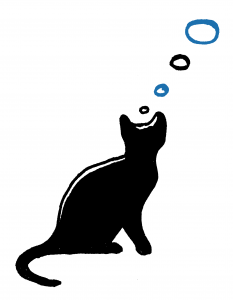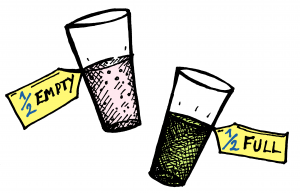
Common Thinking Traps
Here are some of the most common thinking traps:
1. All or Nothing Thinking (Black and White Thinking)
A tendency to see things in extremes e.g. ‘everything is absolutely awful and always will be‘ vs ‘everything is resolved and there will never be any more problems’. The reality for most is somewhere in between i.e. pretty grey. Usually there are some things going well, and some things not. e.g. ‘Some things have improved a bit, but there are still challenges ahead‘ .
2. Jumping to Conclusions
This happens when we assume something (usually the worst) is true without real reason to do so e.g. ‘the last medication / therapy didn’t work so this new one isn’t going to be of any use either’. In fact it often takes many attempts to find the most appropriate treatment for each person.
3. Mind Reading
None of us can really read minds but we spend a lot of time pretending we can. We guess what other people are thinking all the time: whether they like us, whether they are interested in what we are saying etc. This is generally very useful as it helps us to communicate. It can also lead to errors when we assume people are thinking things that they are not e.g. “He just lies in bed all day. He doesn’t want to get better.’ He might be in bed with a temperature, or really struggling with anxiety that makes it difficult to go out, even though he really wants to go outside.
4. Personalising
It’s easy to blame yourself for everything that goes wrong. Many relatives blame themselves for causing psychosis, e.g. ‘If I’d been a better parent then she wouldn’t have got ill.‘ There is no evidence that this is the case. There is also lots of evidence to support the role of many other factors such as genetics, trauma, drugs and stress. Many people with mental health problems have excellent parents and family carers.
5. Focusing on the Negatives (and Ignoring the Positives)
Some people see a half full glass of water as half empty and others see it as half full. Neither is right (or wrong). The difference is that one is focusing on the negatives (the empty half) and the other on the positives (the full half). It’s easy to do this when someone in the family is recovering from psychosis – focusing on all the things they still can’t do that they used to be able to e.g. ‘He’s playing football again. He used to play for the county but now he can’t even get on the pub’s first team.‘ A positive focus might be: “at least he has started playing football again and seems to be enjoying it, getting out and meeting people. This is more than was happening last month”.
Watch Helen discuss changing her thinking and finding perspective
Practice Spotting Thinking Traps

Here are some common examples of negative thoughts from other relatives. See if you can spot any thinking traps.
1. “He can’t do anything at all for himself now. I have to do everything.”
Thinking trap = All or nothing thinking
2. “If this new medication doesn’t help with the voices, then that’s it – there is nothing else to try.”
Thinking trap = Jumping to conclusions
3. “Unless she gets back to university, she will never succeed.”
Thinking trap = All or nothing thinking
4. “There is nothing I can do to help her.”
Thinking trap = All or nothing thinking
5. “She refuses to take her medication – she doesn’t want to get better.”
Thinking trap = Mind reading
6. “The rest of the family think I am to blame for this because I was away so much when he was young.”
Thinking trap = Mind reading (and personalising)
7.”If he doesn’t get better soon, he will never get his life back on track.”
Thinking trap = All or nothing thinking
8. “If I’d been a better parent then she wouldn’t have got ill”
Thinking trap = Personalising
Don’t worry if your answers did not match these. The fact is that many of these would fit into more than one type of trap. For example, the mind reading ones can also be jumping to conclusions. The important thing is to recognise that the way we think about a situation is just one point of view, and there are others that might be worth considering; especially if your current perspective is making you feel distressed.







